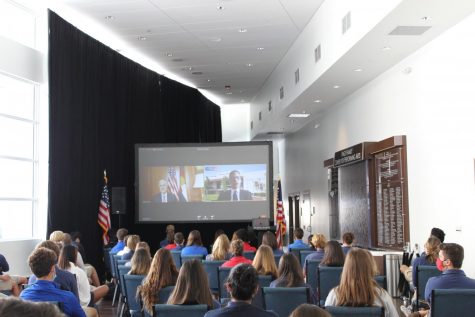
On this past Constitution Day, Thursday, September 17th, students from the law and government classes at The King’s Academy had the unique experience of attending a Zoom call with Neil Gorsuch, a justice on the United States Supreme Court. This call was scheduled as a special event on Constitution Day by the National Constitution Center (NCC) for various middle schools, high schools, and colleges around the country.
After an introduction from Jeffrey Rosen, president of the NCC, Justice Gorsuch began by commenting on the importance of the U.S. Constitution. He believes the Constitution is so important because “miracles don’t happen in clusters”, and a document as important as the U.S. Constitution, written over 200 years ago, may not ever come about again. The goal for the Constitution was so specific. Framers wanted a workable federal government, close to the people, with state power, and individual liberties and rights. “Furthermore,” Gorsuch continued, “it is important that we celebrate people and institutions.” In addition to organizing this Zoom session, the NCC also prepared a special tribute at 6pm to Justice Ruth Bader Ginsburg to present her with the Liberty Medal.
After explaining the importance of Constitution Day, Gorsuch moved on to his personal experience serving on the Supreme Court. In answering a question from a student, Gorsuch stated that the greatest stress about serving on the court is knowing that he is on the last and final court in a long series of courts that many cases travel through. The best part of serving is working with young people, such as the law clerks, in most cases fresh out of law school. Gorsuch has a personal attachment to these clerks because when he was a law clerk, he studied under Ruth Bader Ginsburg, who he became very good friends with. In fact, Gorsuch stated that most of the justices on the court get along very well on a personal level, even as their politics greatly differ. 50 million lawsuits are filed every year, and 95% are resolved in trial court. The Supreme Court hears approximately 70 cases every year, and the voting is unanimous about 40% of the time, a number that combats the public view of the Supreme Court as a warzone of hard politics and disagreement.
There is a lot of pressure in being a Supreme Court justice, and Gorsuch has to try hard to stay grounded in what he believes in. To remind himself of his core values, he has two portraits in his office. The first is a portrait of James Madison, who reminds Gorsuch that the Supreme Court is beyond the individual; it is about the Constitution. The second portrait is that of John Marshall, a former Chief Justice who famously dissented in Plessy v. Ferguson. This portrait reminds Gorsuch that serving on the Supreme Court is about interpreting what the laws are under the Constitution, not what we want them to be.
In closing, Justice Gorsuch tasked students across the country to learn more about the Constitution. It is important to be educated and know our rights, as our rights depend on our recognition of others’ rights, an idea known as ordered liberty. As a final parting message, Gorsuch said this: “Actions create habits, habits create character, and character creates destiny.”
